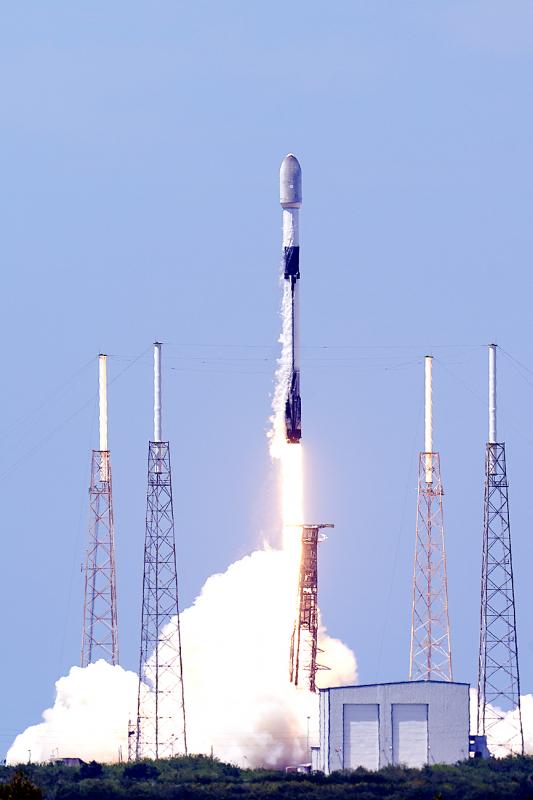Chunghwa Telecom Co yesterday said it is exploring partnerships with low Earth orbit satellite service providers led by Elon Musk’s Starlink project to offer diverse services and enhance its Internet coverage beyond 5G broadband technology.
“There are several non-geostationary orbit satellite systems under development globally, with Starlink taking the lead. Chunghwa Telecom does not rule out seeking exchanges and cooperation with those international operators,” the company said in a statement.
It would comply with the government’s satellite services regulations and evaluate further collaboration opportunities, it said.

Photo: AP
The nation’s biggest telecom said it is paying attention to the development of next-generation technologies for geosynchronous orbit satellites, low Earth orbit satellites, and beyond-5G and 6G connectivity.
Among those, low Earth orbit satellite technology has the potential to help the company diversify its services and supplement terrestrial 5G infrastructure to boost its network coverage, the statement said.
Chunghwa Telecom made the announcement after the Chinese-language Commercial Times yesterday reported that the company is to launch a satellite service with Starlink next year at the earliest.

Photo: CNA
Starlink, a division of US rocket supplier SpaceX, provides Internet access via satellites that are more than 60 times closer to Earth than traditional satellites, resulting in lower latency and the ability to support services typically not possible with traditional satellites, particularly in remote areas.
Starlink has so far signed up 9,000 users in 12 countries, CNBC reported early this month.
Chunghwa Telecom chairman Hsieh Chi-mao (謝繼茂) told the Commercial Times that Starlink and the telecom have begun preparations to launch the service in Taiwan to ensure that satellite communications do not interfere with the transmission of 5G signals.
The telecom must first secure approval from the National Communications Commission (NCC) before it can offer Starlink services to local customers, NCC Vice Chairman and spokesman Wong Po-tsung (翁柏宗) told the Taipei Times.
“We have to check the Ministry of Transportation and Communications’ Radio Frequency Supply Plan (無線電頻譜供應計畫) and Table of Radio Frequency Allocations (頻率分配表),” Wong said.
“Once the ministry has assigned a certain frequency and bandwidth to be used for a low Earth orbit satellite communication, the telecom would have to submit a business plan on how the service is to be offered to local customers,” Wong said.
According to the latest Radio Frequency Supply Plan, which was published early this month, the government is to release the frequencies of 10,700-12,700 megahertz (MHz), 14,000-14,500MHz, 17,700-20,200MHz, 27,500-27,900MHz and 29,500-30,000MHz for low Earth orbit and synchronous satellite communication in the initial stage.
International satellite service providers would be able to form partnerships with local telecoms that hold spectrum at the frequency band of 28 gigahertz.
SpaceX launched a trial for the Starlink service in October last year, offering satellite Internet access at US$99 per month.
Nevada-based Aerkomm Inc last year filed an application with the NCC to offer a low Earth orbit satellite service in Taiwan and was asked to present a more detailed business plan.
In related news, telecoms that qualify for a government subsidy program would soon receive NT$9.92 billion (US$356.67 million) to be spent on 5G infrastructure.
The funding is part of a five-year incentive program announced by the Executive Yuan last year to reward telecoms that accelerate installations of 5G base stations.
Qualifying telecoms would be given a total subsidy of NT$26.6 billion in the next five years for the construction of base stations, according to the program.
Telecoms would be granted subsidies if they build more base stations than they have promised in their business plans. The more they exceeded their goals, the more government funding they would receive, according to the program.
The NCC is to announce next month telecoms that qualify for the funding.

‘DENIAL DEFENSE’: The US would increase its military presence with uncrewed ships, and submarines, while boosting defense in the Indo-Pacific, a Pete Hegseth memo said The US is reorienting its military strategy to focus primarily on deterring a potential Chinese invasion of Taiwan, a memo signed by US Secretary of Defense Pete Hegseth showed. The memo also called on Taiwan to increase its defense spending. The document, known as the “Interim National Defense Strategic Guidance,” was distributed this month and detailed the national defense plans of US President Donald Trump’s administration, an article in the Washington Post said on Saturday. It outlines how the US can prepare for a potential war with China and defend itself from threats in the “near abroad,” including Greenland and the Panama

A wild live dugong was found in Taiwan for the first time in 88 years, after it was accidentally caught by a fisher’s net on Tuesday in Yilan County’s Fenniaolin (粉鳥林). This is the first sighting of the species in Taiwan since 1937, having already been considered “extinct” in the country and considered as “vulnerable” by the International Union for Conservation of Nature. A fisher surnamed Chen (陳) went to Fenniaolin to collect the fish in his netting, but instead caught a 3m long, 500kg dugong. The fisher released the animal back into the wild, not realizing it was an endangered species at

The High Prosecutors’ Office yesterday withdrew an appeal against the acquittal of a former bank manager 22 years after his death, marking Taiwan’s first instance of prosecutors rendering posthumous justice to a wrongfully convicted defendant. Chu Ching-en (諸慶恩) — formerly a manager at the Taipei branch of BNP Paribas — was in 1999 accused by Weng Mao-chung (翁茂鍾), then-president of Chia Her Industrial Co, of forging a request for a fixed deposit of US$10 million by I-Hwa Industrial Co, a subsidiary of Chia Her, which was used as collateral. Chu was ruled not guilty in the first trial, but was found guilty

DEADLOCK: As the commission is unable to forum a quorum to review license renewal applications, the channel operators are not at fault and can air past their license date The National Communications Commission (NCC) yesterday said that the Public Television Service (PTS) and 36 other television and radio broadcasters could continue airing, despite the commission’s inability to meet a quorum to review their license renewal applications. The licenses of PTS and the other channels are set to expire between this month and June. The National Communications Commission Organization Act (國家通訊傳播委員會組織法) stipulates that the commission must meet the mandated quorum of four to hold a valid meeting. The seven-member commission currently has only three commissioners. “We have informed the channel operators of the progress we have made in reviewing their license renewal applications, and